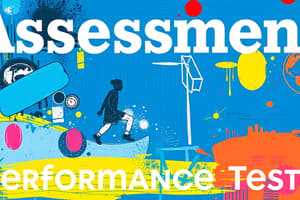Podcast
Questions and Answers
What is the Latin root word for 'assessment' and what does it mean?
What is the Latin root word for 'assessment' and what does it mean?
- Assidere - to gather data
- Assessare - to analyze data
- Assessare - to make decisions
- Assidere - to sit beside another (correct)
How is Assessment in Learning characterized?
How is Assessment in Learning characterized?
- From a single source only
- Static and one-time process
- Based on general objectives
- A process based on specific objectives and from multiple sources (correct)
What is the difference between Assessment in Learning and measurement of learning?
What is the difference between Assessment in Learning and measurement of learning?
- Assessment is informal, while measurement is formal
- Assessment is long term, while measurement is short term
- Assessment focuses on decision-making, while measurement focuses on data collection (correct)
- Assessment uses tools, while measurement only assesses through tests
What is the difference between evaluation and measurement in learning?
What is the difference between evaluation and measurement in learning?
In Assessment and Testing, what does a 'constructed response' refer to?
In Assessment and Testing, what does a 'constructed response' refer to?
What qualities should Assessment and Testing possess to be effective?
What qualities should Assessment and Testing possess to be effective?
Which of the following is a bias-free scoring method?
Which of the following is a bias-free scoring method?
What is the purpose of a Table of Specifications (TOS)?
What is the purpose of a Table of Specifications (TOS)?
Which statistical method is used to describe and interpret test results?
Which statistical method is used to describe and interpret test results?
Which of the following is NOT a type of assessment in learning?
Which of the following is NOT a type of assessment in learning?
According to Classical Test Theory (CTT), what explains variations in examinee performance on a measure?
According to Classical Test Theory (CTT), what explains variations in examinee performance on a measure?
What is the primary purpose of a diagnostic assessment?
What is the primary purpose of a diagnostic assessment?
Which of the following is a characteristic of Classical Test Theory (CTT)?
Which of the following is a characteristic of Classical Test Theory (CTT)?
Which of the following statements about formative assessment is TRUE?
Which of the following statements about formative assessment is TRUE?
What is the primary purpose of a placement assessment?
What is the primary purpose of a placement assessment?
What is the primary purpose of assessment and grading in education?
What is the primary purpose of assessment and grading in education?
Which of the following is a characteristic of traditional assessment?
Which of the following is a characteristic of traditional assessment?
What is the primary purpose of summative assessment?
What is the primary purpose of summative assessment?
Flashcards are hidden until you start studying
Study Notes
Assessment in Learning
- Defined as the process of gathering quantitative and/or qualitative data to make informed decisions relevant to the learners.
- A systematic and purpose-oriented collection, analysis, and interpretation of evidence of student learning.
- Used to further promote and manage learning.
Characteristics of Assessment in Learning
- A process
- Based on specific objectives
- From multiple sources
Comparison with Measurement and Evaluation
- Measurement: actual collection of information on student learning through various strategies and tools.
- Evaluation: the process of making a decision or judgment based on the information collected from measurement.
Types of Assessment
- Formative Assessment: provides information to both teachers and learners on how to improve the teaching-learning process.
- Used at the beginning and during instruction.
- Summative Assessment: determines learners' mastery of content or attainment of learning outcomes.
- Diagnostic Assessment: detects learning problems or difficulties to ensure corrective measures or interventions.
- Done at the beginning of the school year or during instruction.
- Placement Assessment: determines what learners already know or what their needs are to inform design of instruction.
- Used at the beginning of the school year to group learners according to their needs.
Traditional Assessment
- Uses conventional strategies or tools to provide information about student learning.
- Includes objective and subjective, pencil-and-paper tests.
Assessment Formats
- Objective Format: multiple choice, enumeration, etc. with exact correct answers, more bias-free scoring.
- Subjective Format: essay, etc. with less objective scoring, especially if no rubrics are used.
Test Construction
- Table of Specification (TOS): maps out the essential aspects of a test, including test objectives, contents, and item distribution.
Psychometric Theories
- Classical Test Theory (CTT): explains variations in performance due to variations in abilities, estimates item difficulty based on frequency or number of correct answers.
- Item Response Theory (IRT): analyzes test items by estimating the probability of correct or incorrect answers.
Assessment and Grading
- Grading: the process of assigning a value to a learner's performance or achievement based on specific criteria or standards.
- Provides information on whether a learner passed or failed a subject or assessment task.
- Final grade is the summation from multiple sources.
Studying That Suits You
Use AI to generate personalized quizzes and flashcards to suit your learning preferences.




